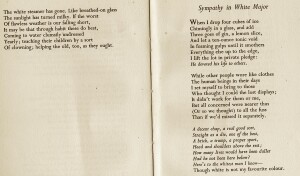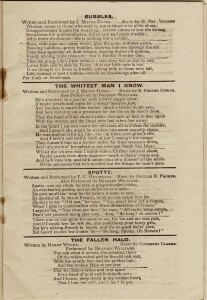 Larkin’s ‘Sympathy in White Major ‘ ( High Windows 1974) is one of his best known poems. It begins with a lip-smacking description of a gin and tonic being poured and ends with the poet drinking the health of ‘Here’s to the whitest man I know, though white is not my favourite colour.’
Larkin’s ‘Sympathy in White Major ‘ ( High Windows 1974) is one of his best known poems. It begins with a lip-smacking description of a gin and tonic being poured and ends with the poet drinking the health of ‘Here’s to the whitest man I know, though white is not my favourite colour.’
The poem is essentially about the doubtful virtues of unselfishness. Larkin lists all the virtues of his ‘white ‘altruistic protagonist: he ‘devoted his life to others ‘, ‘and was ‘a real good sort ‘, implying that these are qualities that are generally admired. However, as Larkin suggests in another poem, ‘Self’s the man ‘, someone who marries and has children is making a selfish choice rather devoting ‘himself to others’. Larkin looks at his own life as a non-white bachelor who has rejected this ‘ family man ‘ lifestyle, and contends that by being a poet and a novelist he has contributed more to society in general than has the ‘ white ‘ family man with responsibilities to others.
But placing its possible interpretation aside, where did Larkin get the phrase ‘the whitest man I knew‘? We know that he was an enthusiast for ‘ trad’ jazz. He owned a large collection of mainly traditional jazz records and some of his writings on jazz were collected in All What Jazz. But was he also knowledgeable in the field of Music Hall recitations and the music that often accompanied them? Was he familiar with the poem ‘The Whitest Man I Know’, which was written in 1913 in the era of Dixieland by the English actor and poet J.Milton Hayes, who also performed it to the music of R. Fenton Gower. There are two versions of the poem. The short one, which is the version being discussed, appeared in Extracts from Musical Monologues (Reynolds & Co., n.d., but c 1918) omits much material significant to the narrative, while the longer version, which is over twice the length, can be viewed online. In the shorter version the narrator tells the story of a man he once knew who on the word of a treacherous woman was sentenced to life for a murder he did not commit. The narrator tells us that he rescued this man and subsequently ‘stowed him on a hooker ‘ ( a sort of fishing boat ) by bribing officials. For his penance the man, we are told, was obliged to work on a boat in the South Seas ‘buying pearls from dirty niggers ‘and selling them on to a ‘ stingy Spanish Jew’. By calling him ’ white ‘ it would seem that Hayes is implying that the man was a sucker for doing penance for a crime he didn’t do…
Both versions of the poem contain a good deal of language which today would rightly be regarded as racist: As we know, Larkin was not averse to using derogatory terms like these in his letters when discussing the problems of racial integration, despite the fact that as a jazz enthusiast some of his most admired musicians were black. He may have been drawn to Hayes’ poem by the colourful language in it. Like the narrator, Larkin may have despised those ‘white ‘ characters who regarded service to others as a moral imperative , seeing them as lacking in a sense of self. To Larkin, perhaps the abnegation of self, practised by the penitent of Hayes’ poem, was not an admirable quality at all if it severely restricted his freedom.
R.M.Healey


It’s actually “the whitest man I know, though white is not my favourite colour.”
My own guess is that it’s about Larkin’s alter-ego, “that spectacled schoolteaching sod” depicted in “The Life with the Hole in It”,where Larkin lamented that “(women mostly) say
But you’ve always done what you want,
You always get your way”
where Larkin had only “never done what I don’t.”
There’s the further complications that the title refers to Theophile Gautier’s “Symphonie en Blanc Majeur” and Montherlant – Larkin’s favourite French novelist – wrote that “Happiness writes on white ink on white paper.”
Did not know Montherlant was Larkin’s favourite French writer. I know his Pearls, Arms and Hashish book from the red Penguin edition and also that he committed suicide, the quote has a nihilist touch…
AND there are three paintings by Whistler called “Symphony in White”.